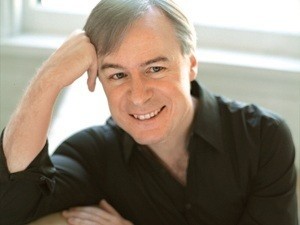|
Back
Opera 43 New York
David Geffen Hall, Lincoln Center
10/10/2018 - & October 12*, 13 2018
Louis Andriessen: TAO (*)
Sergei Rachmaninoff: Rhapsody on a Theme of Paganini, Op. 43
Jean Sibelius: Symphony No. 2 in D Major, Op. 43
Tomoko Mukaiyama (*), Garrick Ohlsson (piano)
Synergy Vocals, New York Philharmonic, David Robertson (Conductor)

D. Robertson (© Michael Tammaro)
“Rachmaninoff’s Rhapsody on a Theme of Paganini sometimes sounds like a plague of insects in the Amazon valley, sometimes like a miniature of the Day of Judgment...and for a change goes lachrymose.”
Pitts Sanborn, New York World-Telegram, January 14, 1936
Pitts Sanborn is, by and large, my favorite music critic, forward-thinking enough to extol the praises of Mahler during a time of relative obscurity, but he could not be more off-base than in his reception of the Rachmaninoff opus in question. For those of you who are unfamiliar with this marvelous essay, it is the piece that Bill Murray learns how to play over many, many lessons in the film Groundhog Day. It is hard to imagine anyone not loving it from day one.
The Rhapsody was premiered with the composer at the piano and the Philadelphia Orchestra on stage with him. They performed it first in Baltimore for one night before going home (Rachmaninoff had a very special relationship with this American orchestra).
Garrick Ohlsson is an amazing pianist, seemingly hardly trying at all, but always presenting the most beautiful, powerful and impactful phrases. He conveyed the core sadness of the piece, which most soloists ignore. Not lost was the poignancy, often subsumed by the ebullience of other pianists. As for the Phil, they sounded a bit tired (this was a morning performance after an evening one), although the strings, led by Sheryl Staples, principal associate concertmaster, were lushly communicative.
In the law of unintended consequences department, moving the celli to the front stage left was an inspiring Jaap idea, but in so doing the ensemble now has a big empty space to fill in front of the already too loud brass section. This is the weakest group in the orchestra and I am not sure that we want to have their miscues be so naked as they were this day.
We began with an oomp of the past, as TAO was written in the last century (1996) and is, by definition, old fuddy-duddy music. Was this a good performance? Who knows, but it was at least somewhat entertaining, Miss Mukaiyama leaving her bench for some interesting posing and plucking.
In 1968 Jack Lord was offered a very handsome salary to star in a new CBS series set in Hawaii. He declined the money but took the job, asking only for a small cut of the profits from the fledgling show. Twelve years later when Hawaii-Five-0 wrapped, Lord was set for life. By contrast, when Jean Sibelius submitted his Valse triste to a publisher, he received the equivalent of one hundred and fifty dollars for complete ownership. The piece became one of the most often performed in the first half of the twentieth century.
I myself came late to Sibelius. As the announcer of my own radio show I fell into a trap, revealed to me by my two young sons listening at home. When we were planning to do something fun but had to insert some otherwise unpleasant task into the immediate future, one of my boys would invariably state “but first, music of Sibelius!” I sincerely regret this initial impression and love the composer quite passionately today. He is my great discovery that I made over the age of 50.
Sibelius was blessed with synesthesia, the ability to see colors when stimulated by a cognitive recognition, in this case something audible, a “malady” that gives his music its unique quality. If Wagner could have his Siegfried walk through the forest and hear its “murmurs”, then Sibelius leads us on a journey through the landscapes of other planets, other worlds.
I have had my differences with conductor Robertson for quite a few years now, and this symphonic performance was marginal at best. Keeping on the brass for another moment, it may be that they are featured too nakedly, but all of their wrong notes are still on them, and there were a ton (yes, I mean you trumpets!). Wind entrances were often tentative and the entire performance was quotidian when not outright unsatisfactory. Pretty standard stuff for some local band, but this is New York and we’re not going to take it anymore!
Fred Kirshnit
|